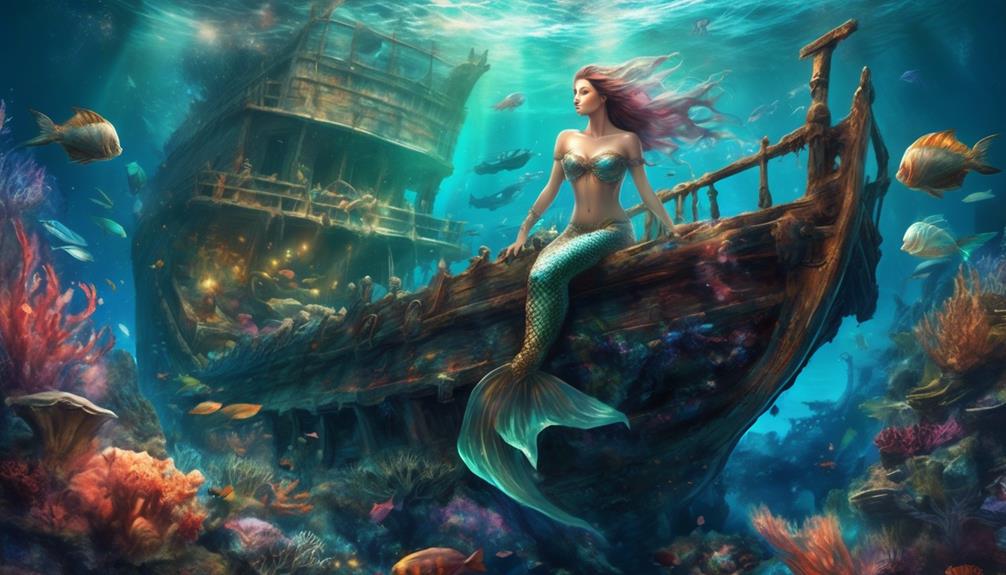Many may not realize that mythical marine tales offer a unique lens through which to explore the depths of oceanography. There is a rich tapestry of folklore and legends surrounding the ocean and its inhabitants, with mermaids being one of the most enduring and intriguing mythical creatures.
By delving into these mythical marine tales, one can gain valuable insights into the interconnectedness between human culture, maritime history, and the scientific study of the ocean. As the exploration unfolds, it becomes evident that the fusion of mythical narratives with oceanography holds the potential to unveil hidden knowledge about the marine world and its significance to humanity.
Key Takeaways
- Mermaid folklore provides valuable insights into historical perceptions of oceanic ecosystems.
- Mermaid legends have had a significant influence on maritime cultures, art, literature, and practices.
- Mermaid sightings have sparked curiosity and prompted oceanographic research, contributing to our understanding of marine life.
- The connection between marine biology and mermaid folklore has captivated researchers and prompts discussions about the impact of human activities on marine ecosystems.
The Mythical Origins of Mermaids
The mythical origins of mermaids can be traced back to ancient folklore and legends from various cultures around the world. These mythical creatures have captured the imagination of people for centuries, appearing in the oral traditions of coastal communities and seafaring peoples.
Mermaids hold significant cultural significance as symbols of both enchantment and danger. In some cultures, they're seen as benevolent beings, providing guidance and protection to sailors, while in others, they're feared as harbingers of storms and misfortune.
The enduring fascination with mermaids reflects humanity's deep-rooted connection to the sea and the mysteries it holds. Whether viewed as purely mythical or rooted in some semblance of reality, the tales of mermaids continue to spark intrigue and wonder, offering a glimpse into the complex relationship between folklore and the marine environment.
Mermaid Folklore and Oceanic Ecosystems
Originating from ancient folklore and legends, mermaids have long been intertwined with the cultural narratives of coastal communities and seafaring peoples, providing a lens through which to explore the relationship between mythical marine tales and the intricate dynamics of oceanic ecosystems.
The interpretation of mermaid folklore in the context of marine conservation is intriguing. These mythical beings often symbolize the connection between humans and the sea, serving as a reminder of the importance of preserving oceanic environments.
By delving into the stories of mermaids and their interactions with marine life, folklore enthusiasts and marine conservationists can gain valuable insights into the historical perceptions of oceanic ecosystems and the human impact on marine biodiversity.
Understanding the folklore interpretation of mermaids can thus offer a unique perspective on the significance of conserving and protecting oceanic ecosystems for future generations.
Maritime Cultures and Mermaid Legends
With their roots in diverse maritime cultures, mermaid legends have permeated seafaring traditions and influenced the narratives of coastal communities for centuries.
Cultural influences have played a significant role in shaping these mythical tales, as each maritime culture has its own unique interpretation of mermaids, reflecting the beliefs and values of the communities from which the stories emerged.
Folklore connections between mermaids and the sea are deeply intertwined with the historical and social fabric of maritime societies, often serving as a source of inspiration for art, literature, and even maritime practices.
These legends haven't only contributed to the rich tapestry of maritime folklore but have also sparked curiosity and fascination with the ocean, transcending geographical boundaries and time periods.
Understanding the maritime cultures and folklore connections behind mermaid legends offers insights into the enduring human fascination with the mysteries of the sea.
Mermaid Sightings and Oceanographic Research
Mermaid sightings have long captured the imagination of seafarers and coastal communities, sparking curiosity and prompting oceanographic research to investigate the mysteries of the sea. The allure of mermaid folklore has often been intertwined with the exploration of marine biodiversity and mermaid symbolism.
These mythical beings, with their origins deeply rooted in maritime cultures, continue to play a significant role in the understanding of oceanic mysteries. Through the lens of mermaid sightings, researchers have delved into the depths of the ocean, seeking to unravel the enigmatic aspects of marine life and the ecosystems that support it.
Marine Biology and the Mermaid Connection
The connection between marine biology and the enduring folklore of mermaids has captivated researchers and inspired a deeper understanding of the intricate life forms inhabiting the ocean depths. Mermaid physiology, as depicted in legends, raises intriguing questions about the potential environmental impact of such mythical creatures.
Marine biologists have delved into the physiological aspects attributed to mermaids, such as their purported ability to thrive underwater, their unique respiratory systems, and their interactions with other marine species. By exploring these aspects through the lens of mermaid folklore, scientists gain insights into the potential adaptations of real marine organisms to their underwater habitats.
Additionally, this connection prompts discussions about the impact of human activities on marine ecosystems and the need for conservation efforts to protect the delicate balance of underwater life.
Conservation Efforts and Mermaid Myths
Researchers have begun to analyze the potential implications of mermaid myths on current conservation efforts in marine ecosystems, drawing connections between legendary tales and real-world environmental concerns. It's intriguing to note that these mythical connections have sparked interest in leveraging mermaid folklore to raise awareness about the protection of marine life.
By intertwining conservation efforts with captivating mythical narratives, conservationists aim to engage a broader audience and emphasize the importance of preserving delicate marine ecosystems. Through this approach, communities can be inspired to take an active role in safeguarding the oceans and its inhabitants.
Furthermore, by associating conservation efforts with mermaid myths, there's an opportunity to instill a sense of wonder and appreciation for the ocean, encouraging people to become stewards of these enchanting and vital natural resources.
Underwater Archaeology and Mermaid Lore
Delving into the depths of underwater archaeology reveals a fascinating intersection with the lore surrounding mythical marine beings. Underwater exploration has uncovered artifacts and remnants that hold cultural significance, often intertwining with the tales of mermaids and other legendary sea creatures.
These discoveries not only shed light on ancient civilizations and maritime history but also offer insights into how these narratives have influenced human perceptions of the ocean. The study of underwater archaeology provides a tangible link between the mythical and the real, allowing researchers to understand how mermaid lore and other marine myths may have originated from actual encounters, ancient seafaring traditions, or symbolic representations.
Future Prospects in Mermaid-Inspired Oceanography
Future prospects in mermaid-inspired oceanography beckon oceanographers to explore the evolving intersection of mythical marine tales and scientific inquiry, offering new opportunities to unravel the mysteries of the sea.
The incorporation of mermaid lore into oceanographic research presents potential benefits for marine conservation efforts. By drawing inspiration from mythical marine tales, scientists can adopt innovative approaches to study and protect ocean ecosystems.
Additionally, mermaid-inspired oceanography may stimulate advancements in oceanographic technology, leading to the development of new tools and methods for exploring the underwater world. These advancements could enhance our understanding of ocean dynamics and support conservation initiatives.
As the field of oceanography continues to evolve, embracing mermaid-inspired narratives may open doors to novel research avenues and contribute to the preservation of our marine environments.
Frequently Asked Questions
What Are the Specific Scientific Methods Used to Study Mermaid Folklore and Its Connection to Oceanic Ecosystems?
Scientific methods used to study mermaid folklore and its connection to oceanic ecosystems involve interdisciplinary research, combining folklore studies with oceanography advancements. This approach sheds light on cultural impact, historical sightings, and conservation efforts.
How Do Different Cultures' Beliefs in Mermaids Impact Current Conservation Efforts and Marine Biology Research?
Different cultures' beliefs in mermaids have a significant cultural impact and influence current conservation efforts and marine biology research. Understanding these myths can help inform conservation strategies and enhance our understanding of marine ecosystems.
What Are Some of the Most Famous Historical Mermaid Sightings and How Do They Relate to Modern Oceanographic Research?
Historical sightings of mermaids have fascinated cultures for centuries, impacting art, literature, and beliefs. These tales have also influenced modern oceanographic research by inspiring curiosity about the unknown depths of the ocean and the creatures that inhabit it.
Are There Any Underwater Archaeological Findings That Have Provided Evidence of Mermaid Mythology?
Underwater artifacts have provided insight into mermaid origins. Scientific evidence and folklore analysis help unravel mythical tales. These findings contribute to understanding cultural beliefs and their impact on oceanographic research.
What Specific Advancements in Oceanography Can Be Attributed to the Study of Mermaid Folklore and Mythical Marine Tales?
Advancements in oceanographic research have shown a folklore connection, inspiring new perspectives on marine conservation. Mythical marine tales have prompted exploration of uncharted waters and led to the discovery of new marine species.

